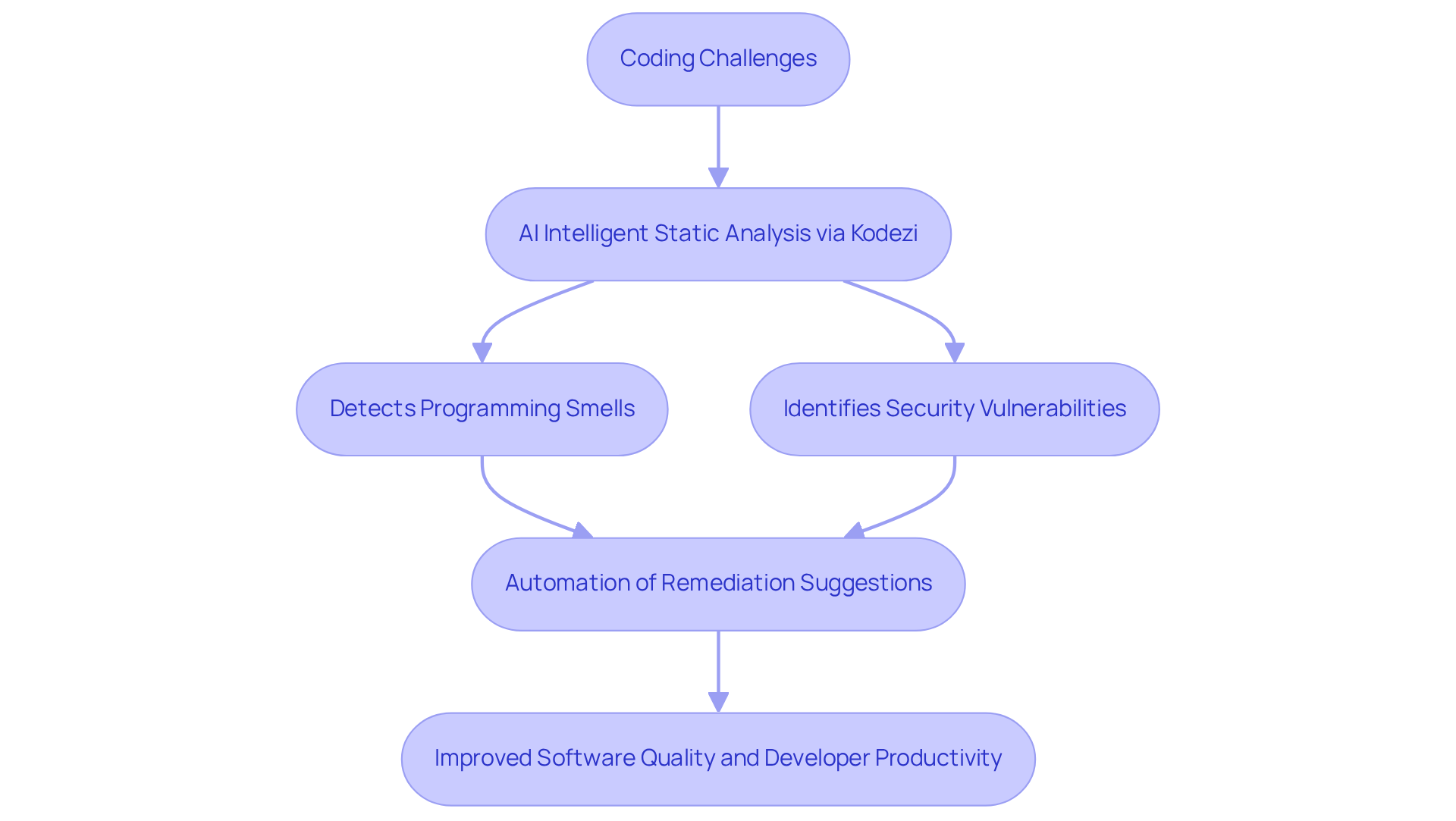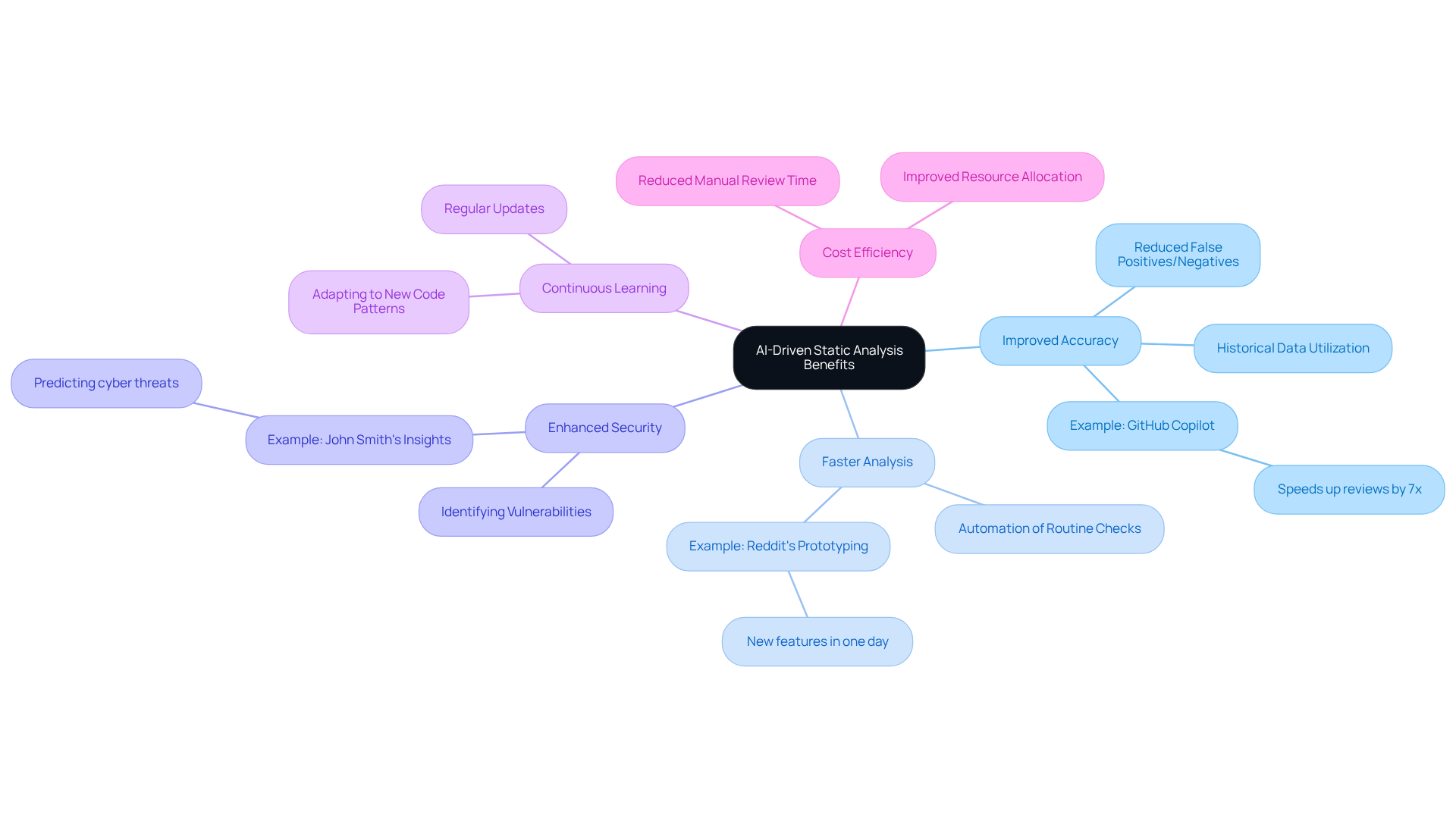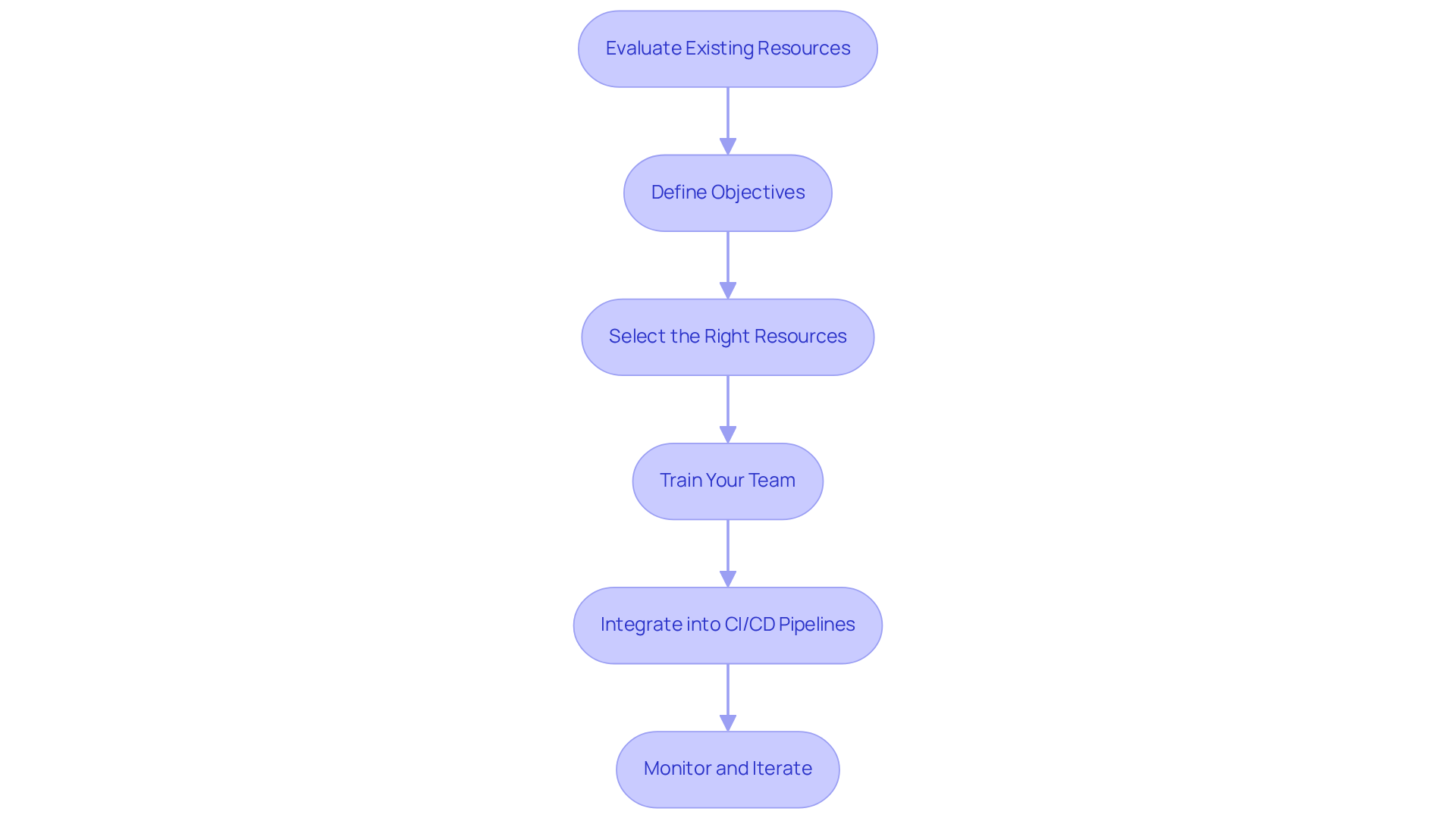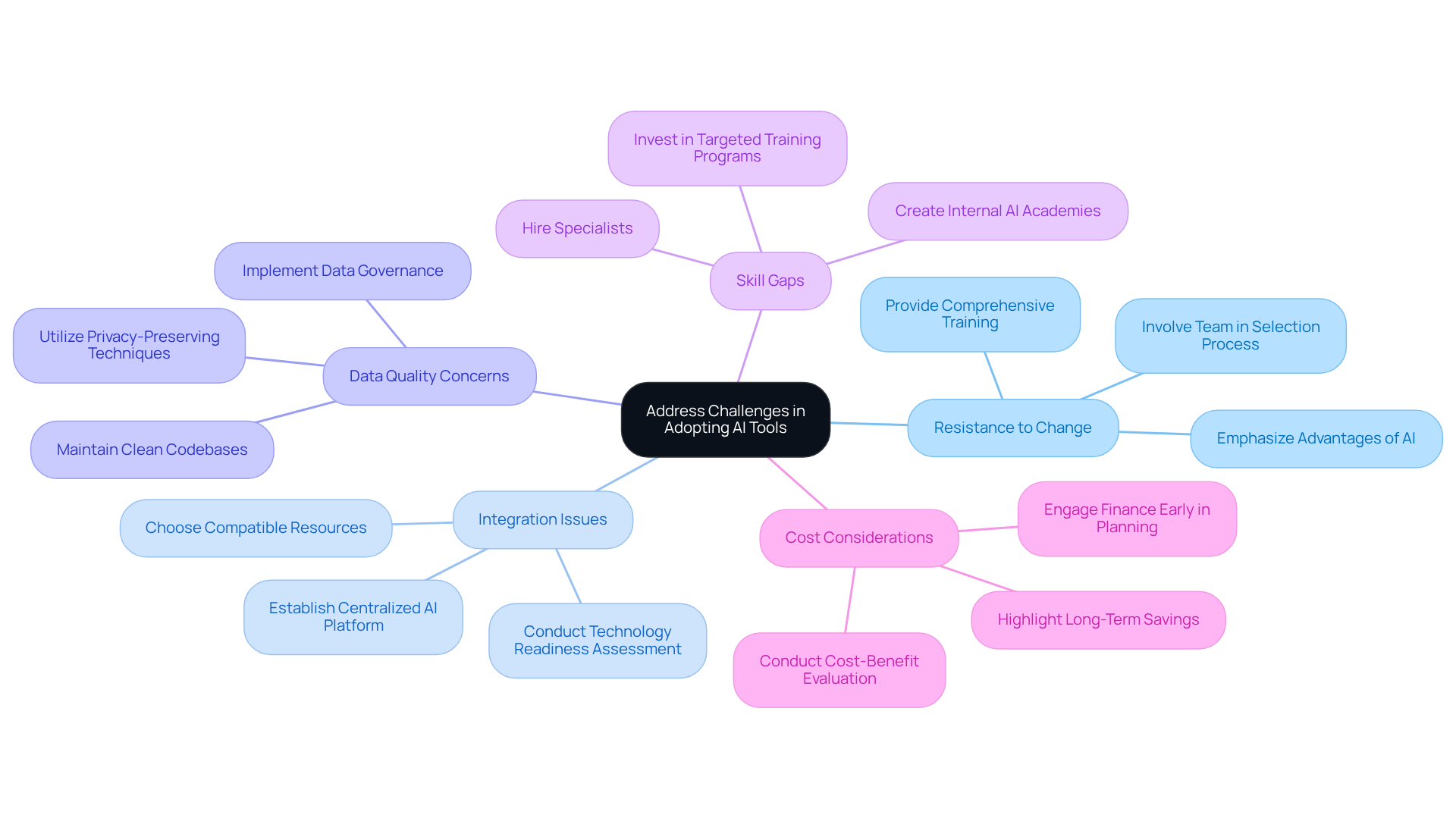Overview
Coding challenges can be daunting for developers. With the increasing complexity of software projects, ensuring code quality and efficiency is more critical than ever. This is where Kodezi comes into play, offering a solution that transforms traditional static analysis through AI-driven capabilities.
Kodezi addresses these challenges head-on by automating bug detection and enhancing code quality. Its intelligent static analysis not only identifies potential issues but also provides actionable insights, making it easier for developers to maintain high standards in their code. Furthermore, Kodezi's user-friendly interface ensures that even those who may not be deeply technical can leverage its powerful features effectively.
The benefits of using Kodezi are clear: improved productivity and enhanced code quality. By streamlining the development process, Kodezi allows developers to focus on what truly matters—building great software. Imagine reducing the time spent on debugging and increasing the overall efficiency of your team. Wouldn't that be a game changer?
Explore the tools available on the Kodezi platform today. With its innovative approach to static analysis, you can elevate your coding practices and achieve remarkable results. Don't let coding challenges hold you back—embrace the future of software development with Kodezi.
Introduction
Coding challenges often leave developers feeling overwhelmed, which can significantly impact both productivity and software quality. But what if there was a way to ease this burden? Enter AI intelligent static analysis tools like Kodezi, which offer a powerful solution to streamline the development process. By leveraging advanced algorithms that enhance traditional methods, Kodezi not only identifies potential issues but also provides actionable insights for resolution.
So, how does Kodezi address these challenges? With features designed to simplify the coding experience, it helps developers navigate complex problems with ease. For instance, Kodezi’s ability to analyze code in real-time allows teams to catch errors early, reducing the time spent on debugging later in the development cycle.
Imagine the benefits: improved productivity and higher code quality. By integrating Kodezi into their workflow, teams can focus more on innovation rather than getting bogged down by repetitive issues. Furthermore, as organizations rush to adopt these innovations, it’s crucial to consider: How can teams effectively integrate AI-driven solutions without falling prey to common pitfalls?
Explore the tools available on Kodezi’s platform and discover how they can transform your coding practices. With the right approach, you can enhance your development process and achieve remarkable results.
Understand AI Intelligent Static Analysis
Coding challenges can be daunting for developers, often leading to frustration and inefficiencies. But what if there was a way to streamline this process? Enter Kodezi, a tool designed to tackle these issues head-on with its innovative features.
Kodezi employs AI intelligent static analysis, which significantly enhances traditional programming assessment methods. Unlike conventional static analysis that merely inspects source code for potential errors and security vulnerabilities, Kodezi leverages machine learning algorithms and natural language processing. This advanced approach not only identifies complex patterns but also provides deeper insights into software quality, allowing developers to proactively address issues before they escalate.
By automating the detection of programming smells, security vulnerabilities, and performance bottlenecks, Kodezi empowers engineering teams to boost their productivity. Imagine a tool that autonomously improves codebases and fixes bugs before they reach production. Kodezi CLI exemplifies this capability, ensuring adherence to the latest security standards and optimizing performance, ultimately enhancing developer productivity.
Organizations that have adopted AI-driven evaluation tools like Kodezi CLI report remarkable improvements in programming quality and maintainability. For instance, a global conglomerate achieved a tenfold return on investment by centralizing application security, showcasing the financial benefits of enhanced software evaluation.
Recent advancements in AI static program analysis have further refined these capabilities. Tools now utilize sophisticated algorithms that not only detect vulnerabilities but also suggest remediation strategies, streamlining the development process. Industry leaders emphasize that these innovations are crucial for maintaining high standards in software delivery, significantly reducing the time and effort required for manual reviews.
However, teams should be mindful of common pitfalls when implementing AI-driven solutions. Over-reliance on automation without proper oversight can lead to missed vulnerabilities. By understanding these challenges, teams can effectively harness AI to enhance their programming evaluation processes.
Ultimately, the software development landscape is being transformed by AI Intelligent Static Analysis. It fosters cleaner, more maintainable codebases, enabling teams to innovate with confidence. So why not explore the tools available on the Kodezi platform and see how they can elevate your coding practices?

Explore Benefits of AI-Driven Static Analysis
Coding challenges can be daunting for developers, often leading to frustration and inefficiency. Fortunately, Kodezi offers innovative solutions that tackle these issues head-on. With its advanced AI capabilities, Kodezi enhances static analysis tools through AI intelligent static analysis, providing developers with a powerful ally in their software development journey.
-
Improved Accuracy is one of Kodezi's standout features. By leveraging historical data, its AI algorithms refine detection capabilities, significantly reducing false positives and negatives compared to traditional methods. For instance, platforms like GitHub Copilot can accelerate programming reviews by up to seven times, resulting in more reliable evaluations. Kodezi CLI takes this a step further, autonomously improving codebases and fixing bugs before they reach production.
-
In addition to accuracy, Kodezi offers Faster Analysis. Automation speeds up the review process, allowing developers to focus on complex problem-solving rather than routine checks. Reddit's product team has successfully utilized AI to prototype new features in just one day, drastically shortening their development cycle. Users have praised Kodezi for its ability to help them find and fix bugs more quickly and easily than manual methods, effectively streamlining their workflow.
-
Enhanced Security is another critical advantage. AI-driven systems that use AI intelligent static analysis excel at identifying vulnerabilities that might escape human scrutiny, bolstering the security of the codebase and minimizing potential risks. Cybersecurity expert John Smith notes that AI solutions enhance efficiency by spotting anomalies and predicting cyber threats. Kodezi's users have highlighted its effectiveness in debugging, making it an essential tool for maintaining secure programming practices.
-
Furthermore, Kodezi embodies Continuous Learning. These systems evolve by learning from new code patterns and developer behaviors, ensuring that insights remain relevant and actionable over time. This adaptability is vital for maintaining high software quality standards. Kodezi's regular updates and responsiveness to user feedback showcase its commitment to continuous improvement.
-
Lastly, Kodezi promotes Cost Efficiency. By reducing the time spent on manual reviews and issue resolution, teams can significantly lower operational costs while boosting overall productivity. This efficiency allows organizations to allocate resources more effectively, ultimately leading to better project outcomes. Users have reported that Kodezi has dramatically improved their engineering teams’ productivity, enabling them to concentrate on higher-level tasks.
Collectively, these benefits streamline the development process, empowering teams to deliver high-quality software more rapidly and with fewer resources. As organizations increasingly embrace AI-driven evaluations, the impact on efficiency and quality in software development continues to grow. Why not explore the tools available on Kodezi and see how they can transform your coding practices?

Implement AI Static Analysis in Development Workflows
To effectively implement AI static analysis in your development workflows, consider the coding challenges developers often face. Bugs, security vulnerabilities, and code readability can hinder progress and productivity. But what if there was a way to tackle these issues head-on?
Enter Kodezi, a powerful AI-driven solution designed to enhance your development process. By integrating AI static analysis, you can significantly reduce bugs, bolster security, and improve code readability. Imagine having a tool that not only identifies issues but also provides actionable insights to resolve them.
To get started, follow these essential steps:
- Evaluate Existing Resources: Begin by reviewing your current fixed assessment resources. Are there deficiencies or opportunities for improvement? Determine if your existing tools can be enhanced with AI features or if new options are necessary.
- Define Objectives: Clearly express your aims for using AI evaluations. What do you hope to achieve? Whether it’s reducing bugs, enhancing security, or improving readability, having defined goals will guide your efforts.
- Select the Right Resources: Choose solutions for AI intelligent static analysis that align with your objectives and seamlessly integrate into your current development environment. Significant alternatives include Kodezi CLI, which independently enhances quality and resolves issues, along with other resources such as SonarQube, Checkmarx, and CodeQL.
- Train Your Team: Equip your development team with the necessary training to effectively utilize the new resources. Understanding AI-generated suggestions is crucial—how can your team implement these insights in practice?
- Integrate into CI/CD Pipelines: Incorporate AI code evaluation within your continuous integration and continuous deployment (CI/CD) pipelines. This ensures automatic code review with each commit, enhancing overall workflow efficiency.
- Monitor and Iterate: Continuously evaluate the effectiveness of the AI fixed assessment resources. Request input from your team—what’s working, and what isn’t? Use this feedback to enhance processes and improve equipment configurations over time.
By following these steps, teams can effortlessly integrate AI performance evaluation into their workflows. The result? Improved software quality and a decrease in technical debt. So, why wait? Explore the tools available on the Kodezi platform today and transform your development experience!

Address Challenges in Adopting AI Tools
Coding challenges can be daunting for developers, often hindering productivity and code quality. But what if there was a way to tackle these issues head-on? Enter Kodezi, a powerful tool designed to streamline your coding process and enhance your development experience.
-
Resistance to Change is a common hurdle. Team members might hesitate to embrace new resources. Involving them in the selection process and providing comprehensive training can help. By emphasizing the advantages of AI resources, you foster a sense of ownership and reduce skepticism.
-
Integration Issues can complicate the transition. Choosing resources compatible with your existing development environment is crucial. This ensures a smooth integration process, allowing your team to focus on what they do best.
-
Data Quality Concerns are another significant factor. AI systems thrive on high-quality data for effective analysis. Establishing strong procedures for maintaining clean and precise codebases will enhance the performance and reliability of AI-driven applications.
-
Skill Gaps may also arise. If your team lacks the expertise to utilize AI resources effectively, consider investing in targeted training programs or hiring specialists. This can bridge the gaps and empower your team to leverage AI capabilities fully.
-
Cost Considerations are often a concern. The initial investment in AI resources can be substantial, but conducting a thorough cost-benefit evaluation can illustrate the long-term savings and productivity enhancements these tools can provide. This makes a compelling case for their adoption.
By proactively addressing these challenges, teams can facilitate a smoother transition to AI intelligent static analysis. Ultimately, this leads to improved code quality and enhanced development efficiency. Why not explore the tools available on Kodezi and see how they can transform your coding practices?

Conclusion
Developers today face numerous coding challenges that can hinder productivity and software quality. Maximizing efficiency in software development through AI intelligent static analysis offers a powerful solution. By adopting advanced tools like Kodezi, teams can significantly enhance their coding practices, streamline workflows, and ultimately improve software quality. This innovative approach not only identifies and resolves issues proactively but also empowers developers to focus on more complex problem-solving tasks.
So, how does Kodezi address these challenges? It integrates AI-driven static analysis into development workflows, providing several key benefits. These include:
- Improved accuracy in detecting vulnerabilities
- Faster analysis processes
- Enhanced security measures
- Continuous learning capabilities
- Notable cost efficiency
By understanding and leveraging these advantages, teams can reduce technical debt and boost overall productivity, ensuring that high standards of software delivery are maintained.
In light of the ongoing challenges faced by developers, embracing AI intelligent static analysis is not just a technological upgrade but a strategic necessity. As organizations navigate this evolving landscape, they are encouraged to explore the tools available on the Kodezi platform. How can these solutions elevate your coding practices? By taking proactive steps towards implementation, teams can foster a culture of innovation and resilience, ultimately driving success in their software development endeavors.
Frequently Asked Questions
What is Kodezi and how does it help developers?
Kodezi is a tool designed to streamline coding challenges for developers by employing AI intelligent static analysis, which enhances traditional programming assessment methods.
How does Kodezi's AI intelligent static analysis differ from conventional static analysis?
Unlike conventional static analysis that only inspects source code for errors and vulnerabilities, Kodezi utilizes machine learning algorithms and natural language processing to identify complex patterns and provide deeper insights into software quality.
What are the benefits of using Kodezi for programming?
Kodezi automates the detection of programming smells, security vulnerabilities, and performance bottlenecks, which boosts productivity and allows developers to proactively address issues before they escalate.
Can Kodezi improve codebases and fix bugs?
Yes, Kodezi CLI autonomously improves codebases and fixes bugs before they reach production, ensuring adherence to security standards and optimizing performance.
What kind of results have organizations seen after adopting Kodezi?
Organizations that have adopted Kodezi report significant improvements in programming quality and maintainability, with some achieving a tenfold return on investment by centralizing application security.
What advancements have been made in AI static program analysis?
Recent advancements include sophisticated algorithms that not only detect vulnerabilities but also suggest remediation strategies, streamlining the development process.
What should teams be cautious about when implementing AI-driven solutions?
Teams should be mindful of over-reliance on automation without proper oversight, as it can lead to missed vulnerabilities.
How does AI Intelligent Static Analysis impact the software development landscape?
It transforms the landscape by fostering cleaner, more maintainable codebases, enabling teams to innovate with confidence.




